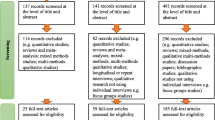Abstract
Most attrition research has focused on dropping out once the patient has arrived at the clinic. However, many potential patients, who are in need of service, do not contact clinics. Such patients are said to be in the appraisal stage of treatment. Discontinuation of appraisal, for whatever reason, can be termed “attrition.” Such attrition has not received adequate attention. A conceptual model of the appraisal process is given, and a review is made of current research bearing on the conditions under which appraisal is continued or discontinued by an individual. Recommendations for future research are made.
Similar content being viewed by others
References
Balch, P. Social class and pathways to treatment at a community mental health center.American Journal of Community Psychology, 1974,2, 365–371.
Calhoun, L. G., Dawes, A. S., & Lewis, P. M. Correlates of attitudes toward help seeking in outpatients.Journal of Consulting and Clinical Psychology, 1972,38, 153.
Chafetz, M. E. The effect of a psychiatric emergency service on motivation for psychiatric treatment.Journal of Nervous and Mental Disease, 1965,140, 442–448.
Clausen, J. A., & Yarrow, M. R. Paths to the mental hospital.Journal of Social Issues, 1955,11, 25–32.
Dahms, A. M. Preferred sources of help in time of crisis as related to conceptual systems of college students.Dissertation Abstracts International, 1969,30 (4-A), 1630.
Fisher, E. H., & Cohen, S. L. Demographic correlates of attitudes toward seeking professional psychological help.Journal of Consulting and Clinical Psychology, 1972,39, 70–74.
Fischer, E. H., & Turner, J. LeB. Orientations to seeking professional help: Development and research utility of an attitude scale.Journal of Consulting and Clinical Psychology, 1970,35, 79–90.
Gould, R. L., Paulson, I., & Daniels, L. Patients who flirt with treatment: The silent population.American Journal of Psychiatry, 1970,127, 166–171.
Gurin, G., Veroff, J., & Feld, S.Americans view their mental health: A nationwide interview survey. New York: Basic Books, 1960.
Holt, W. B. The concept of motivation for treatment.American Journal Of Psychiatry, 1969,123, 1388–1394.
Johnson, D. A. A further study of psychiatric out-patient services in Manchester: An operational study of general practitioner and patient expectation.British Journal of Psychiatry, 1973,123, 185–191.
Kadushin, C. Individual decisions to undertake psychotherapy.Administrative Science Quarterly, 1958,3, 379–411.
Kadushin, C. Social distance between client and professional.American Journal of Sociology, 1962,67, 517–531.
Kadushin, C.Why people go to psychiatrists. New York: Atherton, 1969.
Kalis, B. L., Harris, M. R., Prestwood, A. R., & Freeman, E. H. Precipitating stress as a focus in psychotherapy.Archives of General Psychiatry, 1961,5, 219–226.
Levinson, D. J., Merrifield, J., & Berg, K. Becoming a patient.Archives of General Psychiatry, 1967,17, 345–406.
McMichael, A. J., & Hetzel, B. S. Patterns of help-seeking for mental illness among Australian university students: An epidemiological study.Social Science and Medicine, 1974,8 197–206.
Michael, S. T. The family with problems, social class and the psychiatrist.International Journal of Social Psychiatry, 1967,13, 93–100.
Mikesell, R. H., & Calhoun, L. G.Attitudes toward seeking professional help as a function of causal attribution and severity of disturbance. Paper presented at the annual meeting of the Southeastern Psychological Association, Miami, April, 1971. (Paper is available from senior author at 2430 Pennsylvania Avenue, N.W., Suite 119, Washington, D.C. 20037).
Paradise, D. M. The superego and the helping process: A study of stages of moral development and the search for help.Dissertation Abstracts International, 1972,32 (9-A), 5346–5347.
Phillips, L. D.Bayesian statistics for social scientists. New York: Crowell, 1973.
Redlich, F. C., Holingshead, A. B., & Bellis, E. Social class differences in attitudes toward psychiatry.American Journal of Orthopsychiatry, 1955,25, 68–70.
Sieveking, N. A., & Chappell, J. E. Reactions to the names “Counseling Center” and “Psychological Center.”Journal of Consulting and Clinical Psychology, 1970,34, 124–127.
Sieveking, N. A., & Doctor, R. M. Student attitudes toward psychological and social problems.Proceedings of The 77th Annual Convention of The American Psychological Association, 1969,4, 855–856.
Srole, L., Langner, R. S., Michael, S. T., Opler, M. K., & Rennie, T. A. C.Mental health in the metropolis. New York: McGraw-Hill, 1962.
Tessler, R. C., & Schwartz, S. H. Help-seeking, self-esteem, and achievement motivation. An attributional analysis.Journal of Personality and Social Psychology, 1972,21, 318–326.
Yarrow, M. R., Schwartz, C. G., Murphy, H. S., & Deasy, L. C. The psychological meaning of mental illness in the family.Journal of Social Issues, 1955,11, 12–24.
Author information
Authors and Affiliations
Rights and permissions
About this article
Cite this article
Albers, R.J., Scrivner, L.L. The structure of attrition during appraisal. Community Ment Health J 13, 325–332 (1977). https://doi.org/10.1007/BF01422534
Issue Date:
DOI: https://doi.org/10.1007/BF01422534




